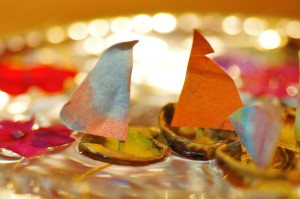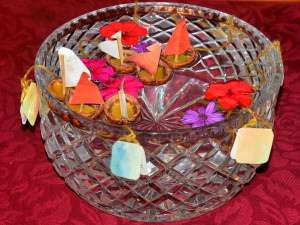Sailing joyfully out of the old and into the new.
 Many New Year celebrations around the world happen in big, rowdy, food and alcohol driven celebrations, inevitably going late into the night– all not very helpful in meeting the needs of young children, nor, for that matter, the needs of those adults who would prefer a quiet, peaceful time for thoughtful reflection on the year past and the year to come. But as with all the family festivals, we can make our celebration of the New Year what we want it to be.
Many New Year celebrations around the world happen in big, rowdy, food and alcohol driven celebrations, inevitably going late into the night– all not very helpful in meeting the needs of young children, nor, for that matter, the needs of those adults who would prefer a quiet, peaceful time for thoughtful reflection on the year past and the year to come. But as with all the family festivals, we can make our celebration of the New Year what we want it to be.
Making New Year relevant for children.
In making a special family time for New Year we can of course look for inspiration in the old New Year traditions involving food and activities (try Wikipedia https://en.wikipedia.org/wiki/New_Year%27s_Eve). To avoid disappointment for children about not being awake at midnight, we can celebrate the New Year’s beginning at the time at the international date line, or with the Pacific Islanders of Kiribati, the first nation to experience the New Year, or to anywhere else around the earth, if it suits our children better. See http://www.timeanddate.com/counters/firstnewyear.html. We can make new traditions to share in our family which meet the needs of our own children more richly and appropriately. A special meal is always a good basis for a family celebration and provides the venue and time for sharing together about the past year. A simple way for children to remember the good things about the past year is to have a jar into which we put reminder notes whenever good things happen. Then at the end of the year you have a jar full of good memories to share on New Year’s Eve.
Remembering the year past
New Year is an ideal time to bring awareness to all the blessings life has brought in the year—the adventures, the learning of new skills, the friendships, even the hard but important lessons. Of course we can also acknowledge the sad things which have moved us–loss, illness, accident, death– which are also part of life. With all these, at this time of year, it is usually more helpful to remain positive and concentrate on our gratitude for what people or things have meant to us or what the events taught us, rather than dwell on the pain or hardship we may have felt.
Recalling the events of the year past can encourage both reflection and appreciation in us all. This can be done with the spontaneous sharing of memories, perhaps taking turns, or it can be given more order by reviewing the year month by month to prompt the memories to flow. Even small children remember their birthdays, holiday times, excursions, treats and will delight in sharing their memories of the good things that have happened.
There are three helpful questions which can deepen this reflective process for ourselves and for children as they mature: What was the most important thing that happened this year? What was the most enjoyable thing that happened? And what happened which was grace-given, which came unexpectedly but was greatly appreciated.
So we can review the year past.
Looking to the future
We can also look into the year to come and prepare the way imaginatively for the new adventures and challenges the children will face– perhaps the first day at school, the taking up of a sport or a musical instrument, a planned school camp or family trip, even a house move or parent absence, and so on. It can be acknowledged that we sometimes may need our courage for some of these new adventures, but we can guide the children to concentrate on embracing the challenges, positively and energetically, rather than dwelling on their fears.
One way to provide a positive start to the year are the traditions which provide blessings for the New Year. An internet search can provide a great variety of possibilities for this in poems, blessings, thoughtful writing. One game which children love in this tradition is the provision of little blessing notes on cards on strings which are draped over the edge of a large bowl of water or other large water container. Each person is given a little walnut boat (or cupped flower?) to blow across the water to one of the blessing cards which then becomes that person’s message for that year.

Building a tradition of sharing stories and learning
A New Year celebration can be a time which encourages deeper more meaningful communication between family members as life unfolds. As the children get older of course their memories and stories get more complex; they will have ventured further afield, developed new skills and interests, asked more complex philosophical questions. In this way an annual New Year sharing can get richer and richer, deeper and deeper, as they grow in their capacities to ponder on the lessons of the year gone by, and their hopes for the coming year. In fact this yearly sharing eventually can become a sharing about our meaningful learning in the year rather than about the year’s events themselves.
This final New Year sharing can be complemented through the year by the encouraging of each family member to tell their stories, especially after excursions and times away from the family. If each person is encouraged to ‘begin at the beginning and tell us what happened’, at each home-coming, it helps all family members to develop genuine listening skills, empathy and appreciation for each other’s important stories, which culminate in this sharing at the year’s end.
New Year offers a unique opportunity for a special family time. If it cannot be done in the evening, do it during the day. It is an opportunity too wonderful to be missed .
See also Creating Family Celebrations